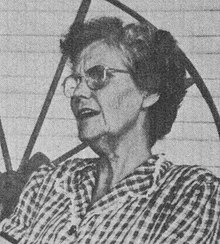Almeda Riddle
Almeda Riddle (November 21, 1898 – June 30, 1986)[1] was an American folk singer. Born and raised in Cleburne County, Arkansas, she learned music from her father, a fiddler and a teacher of shape note singing.[2] She collected and sang traditional ballads throughout her life, usually unaccompanied. Introduced to a wider public by folklorist John Quincy Wolf and musicologist Alan Lomax, Riddle recorded extensively, and claimed to be able to perform over 500 songs.
Almeda Riddle | |
|---|---|
 in the 1960s | |
| Background information | |
| Birth name | Almeda James |
| Born | November 21, 1898 Cleburne County, Arkansas, United States |
| Died | June 30, 1986 (aged 87) Heber Springs, Arkansas |
| Genres | Folk |
| Occupation(s) | Singer, songwriter |
| Instruments | Vocals |
| Years active | 1959-1984 |
| Labels | Rounder, Prestige, Atlantic |
She was born Almeda James and was a first cousin twice removed of the outlaws Frank and Jesse James. On a recording of the song "Jesse James" she noted, "I'm sure you've read of Frank and Jesse James. Well, my father's grandfather and their father (Robert S. James) was brothers. I never was ashamed of the James boys was my cousins, but neither was I proud of it." In old age, she was often known as Granny Riddle.[3]
In October 1959, on Wolf's recommendation, Lomax and Shirley Collins recorded Riddle at her home in Heber Springs in The Ozarks. The 23 songs reflected Lomax's interest in traditional ballads and songs for children.[4] Collins recalls:
- She was a singer of such composure and quiet intensity, that you were compelled to listen. .... There was such clarity in her style, and she had that rare and admirable quality of serving the songs, rather than the songs serving her.[5]
Children's songs from this session were issued on American Folk Songs For Children in the Atlantic Records' Southern Folk Heritage series of LPs and was reissued as the Atlantic Records box set Southern Folk Heritage. In 1964 she recorded Songs And Ballads Of The Ozarks for Vanguard Records. Several of her ballads were issued on various albums in the Prestige Records Southern Journey series of LPs, and reissued on CDs in the Rounder Records series Southern Journey: The Alan Lomax Collection. These records made Almeda Riddle widely known to participants in the American folk music revival. From 1962 onward she accepted invitations to perform at folk festivals and college campuses. She toured extensively for twenty years until prevented by ill health.
In 1970 Riddle co-authored with folklorist Roger D. Abrahams an autobiography titled A Singer and Her Songs that included many of her songs.[6] In 1972 and 1978, she made studio recordings for Rounder Records, which were issued on two solo LPs.
Riddle was a recipient of a 1983 National Heritage Fellowship awarded by the National Endowment for the Arts, which is the United States government's highest honor in the folk and traditional arts.[7] In 1984 she was filmed by George West for Folkstreams. In the film titled Almeda Riddle: Now Let's Talk About Singing (released in 1985),[8] she sang and spoke about her life and songs.
In December 1984 she moved into a nursing home in Heber Springs, where she died on June 30, 1986. She is buried next to her husband at Shiloh Cross Roads Cemetery.[1]
The introduction to the 1997 cult film Gummo features Riddle's rendition of "I Love My Rooster."
Discography
- Songs And Ballads Of The Ozarks (Vanguard Records) 1964
- Ballads And Hymns From The Ozarks (Rounder Records) 1972
- More Ballads And Hymns From The Ozarks (Rounder Records) 1976
- Granny Riddle's Songs And Ballads (Minstrel) 1977
- My Old Cottage Home (reissue of Ballads & Hymns from the Ozarks) (Albatros) 1979
- How Firm A Foundation (Arkansas Traditions) 1985
References
- West, George (March 9, 2016). "Almeda James Riddle (1898-1986)". Encyclopedia of Arkansas. Central Arkansas Library System. Retrieved November 8, 2019.
- Govenar, Alan, ed. (2001). "Almeda Riddle: Anglo-American Ballad Singer". Masters of Traditional Arts: A Biographical Dictionary. vol. 2 (K-Z). Santa Barbara, CA: ABC-Clio. pp. 532–534. ISBN 1576072401. OCLC 47644303.
- "NEA National Heritage Fellowships: Almeda Riddle". www.arts.gov. National Endowment for the Arts. Retrieved November 8, 2019.
- Collins, Shirley (2007). America Over the Water. Middlesex, England: SAF Publishing. pp. 215–217. ISBN 9780946719914. OCLC 851973736.
- Collins, Shirley (2007). America Over the Water. Middlesex, England: SAF Publishing. pp. 158–162. ISBN 9780946719914. OCLC 851973736.
- Riddle, Almeda; Abrahams, Roger D. (1970). A Singer and Her Songs: Almeda Riddle's Book of Ballads. Baton Rouge: Louisiana State University Press. ISBN 9780807100219. OCLC 141470.
- "NEA National Heritage Fellowships 1983". www.arts.gov. National Endowment for the Arts. Retrieved November 8, 2019.
- "Almeda Riddle". IMDb.com. n.d. Retrieved November 8, 2019.